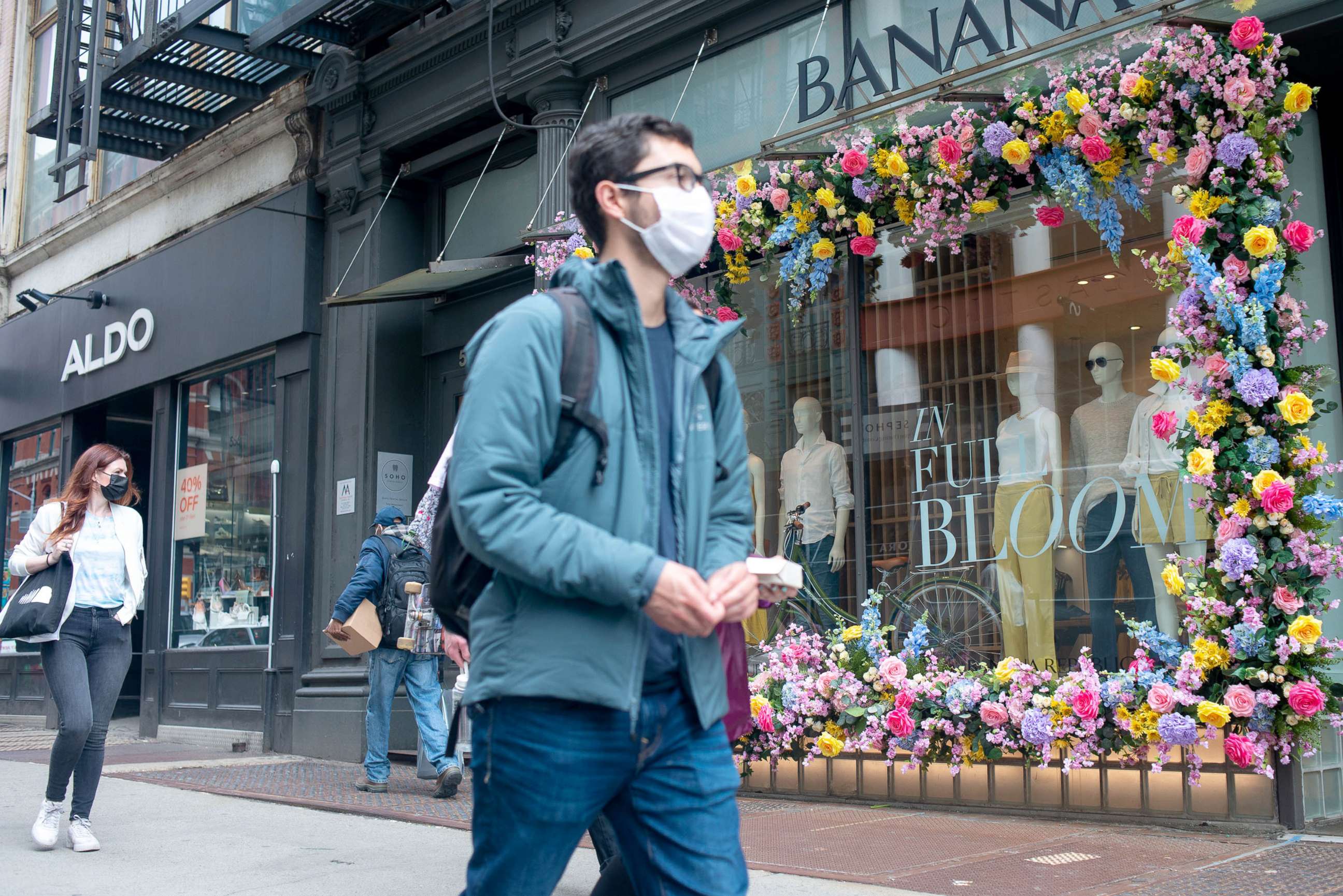Even with vaccinations on the rise, epidemiologists urge caution as nation reopens
"There's a real danger in the United States of having yet another surge."
Even with millions of vaccine shots pricking arms every day, epidemiologists are warning that it's too soon for states to ease up on public COVID-19 measures without risking another surge.
Although more than 47 million people in the United States have been fully vaccinated -- 32 states, plus Washington, D.C., now are offering vaccines to anyone 16 or older -- experts agree we're nowhere near herd immunity.
But several states -- Iowa, Mississippi, Texas and Wyoming among them -- have fully reopened, repealing all COVID-19-related mandates. Other states are continuing to loosen their own restrictions.
Nationwide "the number of cases in the country has plateaued. That's not good. They should keep going down and down," Dr. Anthony Fauci said on "Good Morning America" on Tuesday. "We've seen this before: When you plateau like that, there really is a danger of a resurgence."

Meanwhile, there are worrying signs the pandemic may be accelerating in some parts of the country, with 20 states now reporting more than a 10% increase in the number of new cases. Epidemiologists interviewed by ABC News said there are myriad reasons it's too soon to ease mandates, including the new and more contagious COVID-19 variants, undetected cases and worries about long COVID.
"There's a real danger in the United States of having yet another surge of cases in spite of vaccinations" due to both relaxing restriction and the possible variants, said Dr. Stanley H. Weiss, a professor of medicine at Rutgers New Jersey Medical School and a professor of biostatistics and epidemiology at Rutgers School of Public Health. "I think that the risk of the variants further propagating the epidemic is very real."
That's because some versions of the virus now circulating across the globe have developed worrying mutations that could help them spread faster and farther.
Houston was one of the first major U.S. cities with a confirmation of the B.1.1.7 variant, aka the U.K. variant. While the positivity rate is decreasing in Harris County, the number of variants is increasing, according to Rafael Lemaitre, communications director for Harris County Judge Lina Hidalgo.
"We see the urgency to vaccinate as a race against those variants," Lemaitre added. Harris County remains at a severe threat level -- with the usage of intensive care beds, average total cases and positivity rate still high.
Using multiple metrics to inform reopening, like Harris County is doing, is recommended by epidemiologists who said that looking only at case numbers or vaccination rates by themselves isn't sufficient.
"Cases alone may not tell a full story," said Dr. John Brownstein, an epidemiologist with Boston Children's Hospital and an ABC News contributor. "Testing may not tell a good story either, because there's a decrease in testing."

A greater focus on vaccinations has meant less testing for COVID-19.
"You have all the variants that haven't been detected because of limited testing," Weiss explained. "If you don't look, you don't find."
The concern for asymptomatic spread also affects another part of the equation. Experts say that beyond the variants, there's another worrying reason it may be too early to ease restrictions: the risk of long-haul symptoms. Although older adults are more likely to die of COVID-19, younger adults can be spreaders – and may develop long-term health problems that doctors are still working to fully understand.
While 71% of adults 65 and older have received at least 1 dose of the vaccine, lower-risk younger adults are still at risk for complications from an infection.
"We talk about outcomes as if it's binary. Either you're unlucky and you die or you have a mild case, and you get over it. But we're learning more and more about these long-term effects," said Dr. Catherine Troisi, an infectious disease epidemiologist at UTHealth School of Public Health in Houston.
Troisi and Weiss both noted the death of Texas Roadhouse founder and CEO Kent Taylor. He died by suicide last week after suffering from unbearable chronic symptoms related to the virus, including tinnitus, a ringing in the ears commonly reported in long COVID.
About "10 to 40% of people who are infected may get those longer-term consequences, some of which can affect the heart, some of which can affect a person's nervous system and pain," Weiss said.
Despite these concerns, epidemiologists still remain cautiously optimistic.
"It's not all or nothing," Brownstein said. "We can take things gradually, look at the data and continue to reopen. The more challenging situation will be -- as opposed to a dimmer switch -- a full light switch on. That's when we start seeing unnecessary upticks and, more importantly, hospitalizations."

A large part of returning to normal will also depend on personal responsibility. In Texas, where restrictions have been lifted completely, Lemaitre noted that Houston residents and businesses are still working together to require masks and reopen safely, removing politics from the equation.
"We all have some responsibility for our health," Troisi said. "I don't think we emphasize this enough, but there's a community responsibility to wear a mask and to practice social distancing."
"We're a global society," she added. "There's a public health saying that there's no 'peeing section' in the swimming pool."
Tarun Jain, M.D., a chief resident physician in internal medicine and pediatrics, and Samuel Rothman, M.D., a resident physician in psychiatry, are contributors to the ABC News Medical Unit. ABC News' Arielle Mitropoulos contributed to this report.



